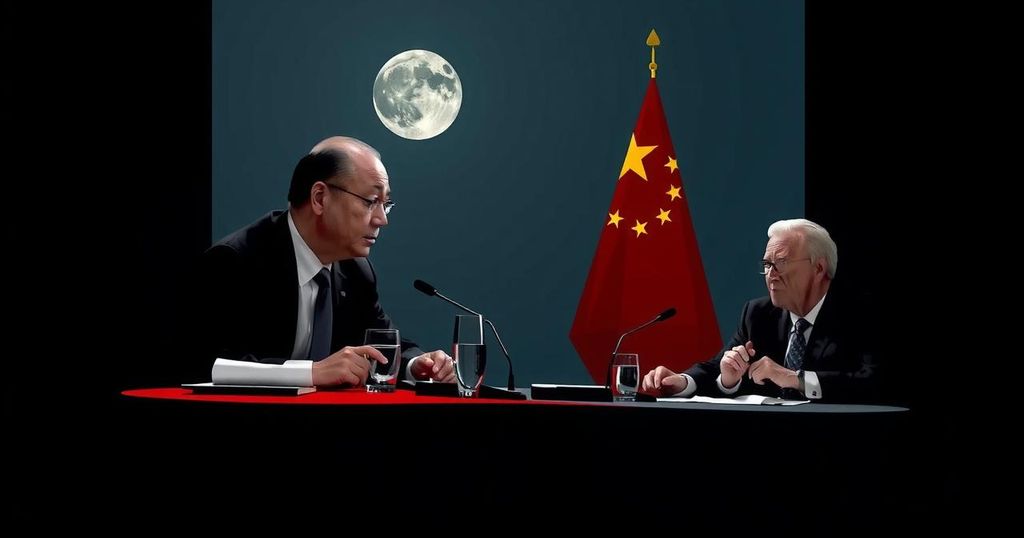Sullivan’s Visit to China: A Crucial Step in U.S.-China Relations under Biden Administration
U.S. National Security Adviser Jake Sullivan has embarked on his inaugural visit to China, underscoring the significance of Sino-American relations amid the Biden administration’s broader foreign policy agenda. Sullivan’s meetings with Chinese Foreign Minister Wang Yi, which have occurred on four previous occasions across various global locales—including Vienna, Malta, Washington, and Bangkok—have focused on stabilizing the often fraught connections between the two nations. Their most recent discussion took place shortly after a crucial summit between Presidents Xi Jinping and Joe Biden, aimed at recalibrating a tense diplomatic landscape.
The current set of talks, scheduled for Tuesday and Wednesday, demonstrates that China remains a critical priority for President Biden as he approaches the twilight of his presidency. While the White House has been circumspect about associating this visit with the upcoming U.S. presidential elections, the timing cannot be overlooked. Should Mr. Sullivan facilitate preparations for a subsequent summit between President Biden and President Xi, it would mark a notable conclusion to the current administration’s complex foreign policy engagement with China.
China views this moment as a “critical juncture,” acknowledging the inherent challenges of dialogue with Washington. As the U.S. presidential election landscape evolves, particularly with the potential candidacy of Kamala Harris succeeding President Biden, China is keenly aware of the implications for future policy direction. Former President Donald Trump has signaled intentions to escalate tariffs on Chinese imports, potentially deepening the trade disputes initiated in 2019—a situation that Beijing is observing closely. Under President Biden, the administration has maintained some Trump-era tariffs while also imposing new ones, including restrictions on electric vehicles and solar panels manufactured in China. Moreover, the Biden administration has taken steps to strengthen alliances in Asia as a countermeasure to China’s growing influence in the region.
While the Harris campaign has not distinctly articulated its stance toward China, the significance of Mr. Sullivan’s visit lies in its intention to further the objectives set by the current administration rather than to shape the course for the next one. Nevertheless, China aims to utilize this opportunity to delineate its priorities, with the Taiwan issue remaining a pivotal concern. Statements from the Chinese Ministry of Foreign Affairs highlight the need for dialogue regarding Taiwan, as Beijing remains resolute in its opposition to any indication of support for Taiwanese independence from Washington.
In parallel, trade relations will also dominate discussions. Chinese officials have expressed dissatisfaction with U.S. tariffs, urging an end to the politicization of economic matters and advocating for greater exchanges between the two nations.
Upon assuming office, President Biden sought to establish a more stable framework for U.S.-China relations, which he perceived to have been destabilized by the previous administration’s unpredictability. His administration has aimed for a responsible management of competition with China through subtlety rather than overt confrontation. However, recent events have tested this approach, including heightened tensions following the downing of a Chinese surveillance balloon by the U.S. military and ongoing issues related to China’s support for Russia amid the Ukraine conflict.
The broader ramifications of China’s assertiveness, including its cooperation with countries that have contentious relationships with the United States, such as Iran, and the domestic consequences of the influx of Chinese-produced precursors for synthetic opioids like fentanyl, contribute to the complexities of U.S.-China dialogue. This growing crisis has prompted bipartisan concern within the U.S. government, amplifying the urgency for resolution.
The objective of these discussions remains the establishment of “stable relations”. The previous summit between Mr. Biden and Mr. Xi in San Francisco was instrumental in addressing a multitude of pressing issues. Since then, the acknowledgment of differences has not deterred both parties from seeking mechanisms to mitigate tensions, evidenced by recent negotiations surrounding the curtailment of fentanyl production.
In conclusion, the anticipated meetings between Mr. Sullivan and Mr. Wang serve not only as a platform for assertive diplomatic engagement but also reflect the ongoing necessity of direct interactions between the two leading global economies. Such meetings are integral to fostering an environment of trust and understanding, vital for navigating the complicated terrain of U.S.-China relations. Mr. Sullivan’s prior discussions with Mr. Wang provide a foundation for what both factions hope to achieve in their pursuit of stability in bilateral interactions.








Post Comment